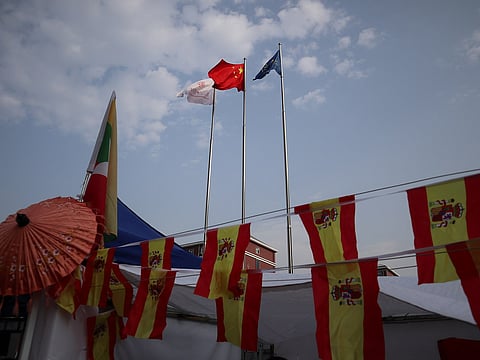

Spanish Prime Minister Pedro Sánchez arrived in Beijing on Thursday, marking his third visit to China in as many years and becoming the first European leader to meet with Chinese President Xi Jinping since the United States escalated its tariff measures against China and other nations.
Sánchez’s two-day trip to China follows a stop in Vietnam and comes amid rising geopolitical tensions triggered by U.S. trade policy under President Donald Trump. In Ho Chi Minh City earlier this week, Sánchez praised the temporary pause in U.S. tariffs on most countries — excluding China — as “a gateway to negotiation and agreement.”
The visit, which coincides with the 20th anniversary of the China-Spain Comprehensive Strategic Partnership, underscores Spain’s increasing interest in expanding economic ties with China, despite strong warnings from Washington. U.S. Treasury Secretary Scott Bessent, speaking on Fox News, criticized Spain’s overtures to Beijing, calling them “a losing bet for the Europeans” and likening such a move to “cutting your own throat.”
China swiftly rebuked the U.S. remarks. Foreign Ministry spokesperson Lin Jian said Washington’s tariff tactics amounted to “threatening and blackmailing the world,” accusing the U.S. of attempting to coerce countries into submission through economic pressure.
Trade Expansion Despite Imbalances
China is Spain’s fourth-largest trading partner and its second-largest supplier of goods, though it ranks only twelfth in terms of destinations for Spanish exports. In 2024, Spain imported over €45 billion in goods from China, while exports to China totaled just €7.4 billion, according to Spain’s Ministry of Economy.
Despite the imbalance, both countries are pushing to expand cooperation in sectors such as energy, technology, and logistics. China invested €131 million in Spain in 2023, while Spanish investment in China reached €91 million.
More than 14,500 Spanish companies maintain commercial relations with China, exporting mostly chemicals, minerals, and industrial components. Chinese exports to Spain include machinery, textiles, consumer electronics, and, increasingly, vehicles.
Sánchez has emphasized multilateralism as a counterbalance to growing protectionist pressures. “Spain defends a world with open doors — a world in which trade unites our people and makes them more prosperous,” he said during his Vietnam visit.
EU-China Cooperation Intensifies
Sánchez’s visit coincides with increased diplomatic engagement between China and the European Union. Chinese Premier Li Qiang recently held a phone call with European Commission President Ursula von der Leyen, affirming China’s readiness to work with the EU on strengthening bilateral ties. In a separate video conference, Chinese Commerce Minister Wang Wentao and European Commissioner Maros Sefcovic agreed to begin consultations on market access and investment cooperation in the automotive sector, including electric vehicles.
Amid heightened U.S. tariffs, European leaders are reassessing their approach to global trade. Sánchez, speaking to reporters earlier in Vietnam, urged the EU to reevaluate its economic relationship with China. “The U.S. approach is forcing everyone to adapt. Europe must change its stance toward both the U.S. and China,” he said.
Chinese experts see a growing convergence between Beijing and Brussels. “It is imperative for China and the EU to confront U.S. unilateralism together,” said Cui Hongjian of Beijing Foreign Studies University. He warned that Washington’s pressure campaign threatens the multilateral trading system that underpins global economic stability.
Ding Chun, director of the Center for European Studies at Fudan University, emphasized the need for Europe to “make strategic choices that truly serve its own interests,” acknowledging the bloc's internal divisions but urging deeper EU-China collaboration in global governance.
As trade and geopolitical alliances shift, Sánchez's visit signals Spain’s commitment to pursuing balanced and diversified international partnerships, even amid transatlantic strains.